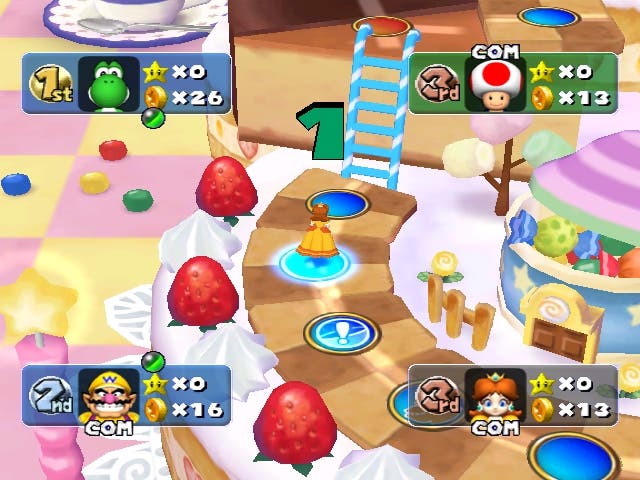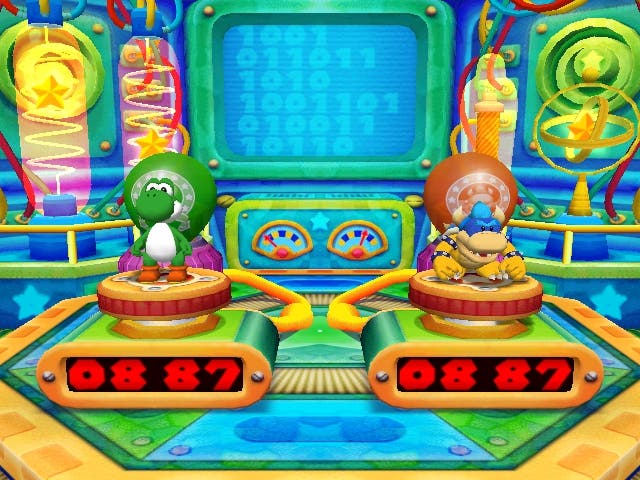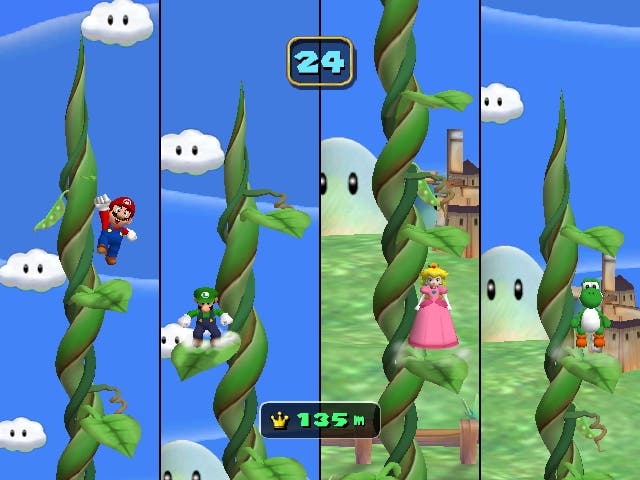Mario Party 5
Expect the expected!
There aren't many game series that stretch to a fourth sequel, and, of the ones that have, Mario Party is perhaps the least understandable. While the Final Fantasies of this world could feasibly go on forever, reinventing themselves once every couple of years, consistently growing and harnessing new technology inventively to satisfying effect, Mario Party is a perpetual board game where event icons throw up mini-game challenges for an immovable cast of familiar Nintendo characters decked out in sugary Fisher Price coating. All the same, here we are with Mario Party 5, which offers yet another selection of vacuous mini-games, a board game to justify them and a few more perks for single players than its predecessor. It's top of the charts in Japan as I type, and it's not at all obvious why.
Welcome back

Through various revisions the four-player board game at the core of Mario Party has now grown into a relatively complex beast. Here's what you need to know (pay attention): between one and four human players (with CPU controlled adversaries making up the numbers) pick a Nintendo character and roll an apparently ten-sided die to move around a mostly circular board, occasionally branching off or wandering into a teleporter. The object of the game is to collect stars, which are positioned in the farthest flung corners of the board and require 20 coins for any player to "win" them when they get there. Coins meanwhile are won or lost by competing in various mini-game tasks, which befall players when they land on a circle with an icon, and these mini-games are split into various categories that we'll deal with later on.
Another way to collect or lose coins is to make use of capsules, which are dispensed by a chirpy gumball machine whenever you pass it (rather than being purchased from a shop, as they were in MP4), and allow players to use a given item on themselves, or place it on a blue circle up to ten spaces ahead - if it's something like a mushroom (which gives you an extra spin of the dice), then it's worth holding onto, while something like a piranha plant trap or Donkey Kong slapping is worth deploying to snare a few coins when opponents pause on top of it. Anyway, when the chosen number of rounds has elapsed, the game is over and the player with the most stars wins - while the game will or won't award bonus stars for various feats depending on your preference in setting it up.
Does that sound like fun to you? Because, for me, it's needlessly complex. Not to mention slow-paced. Although developer Hudson has tried to make the waiting time for each player slightly less agonising this year, it's still ridiculously boring sitting around waiting for each individual player to move, waiting for any resulting animation to finish, waiting for the game to skip through the same dialogue boxes when dispensing capsules, and generally waiting for events to unfold. It's particularly aggravating when you're watching a CPU player, with no control over how fast or slow the little silicon bastard skips through text boxes and navigates menus. And why you can't skip the repetitive animations - like a palm tree rising slowly out of the board and Donkey Kong appearing to punch whoever's on top - is anyone's guess. They're quite ticklish the first time, or when someone unfortunately wanders into yours, but they're not exactly comedy gold. It's just bizarre, really, for a fifth-in-the-series title to be so, well, unrefined.
ACME board games

However it is clear that Hudson has made some efforts to try and remedy this, particularly for single players. This time out there's a Story Mode in addition to the vanilla Party Mode, in which Mario or one of his seven partying pals gets to take on a trio of Mini-Bowsers, who all move simultaneously. The goal here is not to win on stars, but to run each of the three Mini-Bowsers down to zero coins within the allotted number of turns. This is pretty easy because, unlike the main Party Mode board game, here events are almost all of the "Super-Duel" variety, in which the player goes one-on-one against a Mini-Bowser, robbing them of between 5 and 15 coins depending on whose go it is. With five boards to conquer, the single player game takes around three hours or so - including an incongruous final boss fight that genuinely rivals most platform or adventure games.
But while the Mini-Bowsers are carbon copies of one another and move simultaneously, there's no escaping the wait for animations to complete, menus to be dispensed with, capsules to be placed, challenges to be undertaken, etc, so Mini-Bowser turns still take a good long while. Given the huge dose of chance involved in much of Mario Party and you can add "frustrating" to the list of complaints - it's easy enough to start the game and find yourself at an irreparable disadvantage without it having anything to do with your own skill level, and that's hardly a plus point for a single player game by any stretch of the imagination.
It doesn't help matters that the quality of the mini-games on offer varies immensely, and this drags down even the rowdiest of multiplayer games - and certainly leaves you gagging for something else when you're left to contemplate it on your own. For example, one mini-game has you and your opponent pick one of three ropes and pull on it, the idea being that one of them has a 100-ton weight at the top of it. Loser gets squashed. It's pure chance, and when you lose against a CPU opponent you'll think it's a complete farce. Likewise the mini-game in which you have to butt-stomp a circle of buttons, all but one of which are linked to some sort of "hilarious" pratfall. Guess the right one first and you win. This sort of thing might work on cheap Saturday evening game shows with a fridge/freezer at stake, but haven't party/mini games evolved beyond that by now? Has nobody at Hudson even seen some of the stuff in Wario Ware? Or Super Monkey Ball?
Mini-games for mini-gamers

Granted it's not all bad. Button-mashers aside (since they just about get away with it through a mixture of clever packaging and varying concepts), most of the games on offer have their moments. Piece Out, for example, is a puzzle game where two players have to use a claw to drag blocks off a central conveyor belt and position them in a grid. When the grid's full, it empties and you bank loads of points, getting extra credit for working with corresponding colours. Although the pseudo-3D game board sometimes renders block placement that little bit less than intuitive, it's actually a darn sight better than most puzzle game ideas I've seen these past 12 months. Mini-games like the quick-draw also appeal, as two party poopers face off in the old west, aiming to be the first to poke a button when it's flashed up. Hit the right one first and you win, hit the wrong one at the wrong time and it all backfires. In fact, even games with slight perspective issues - like the cloudy jump-and-bump block-finding effort and the air bazooka game (which feels a bit like Monkey Punch) - manage to be relatively entertaining when played with others, while some games (like the pop-up-Whomp maze or the electric "amp" dodging effort) are borderline genius when played with the right people. Naturally though they all take far too long to start.
It's just the way it's all been put together that fails to capture my heart. The whole game is just too frilly for what it is, rendering the board game too tedious to play and the outcome too random for it to rank alongside rival party games - particularly on the console that Monkey Ball calls home. In fact, MP5's saving grace is that you can actually delve into all 60-plus mini-games in a variety of different ways once you've "unlocked" them on game board. Through the Mini-Game mode you can tackle them in any order you like (Free Play), in another odd little board game (Circuit), randomly thanks to a roulette wheel (Battle), to capture tiles on a hexagonal battlefield (Wars), in groups of ten (Decathlon), or in a knock-out Tournament that focuses on the two-player duels. Although it would be nice to have them available from the start, Mini-Game mode will probably stand up to the most play.
And then there's Bonus mode, which includes a trio of slightly more involved mini-games that warrant their own paragraph. Firstly there's the weakest of the three, Card Party, in which players roll the dice and try to reach stars in a card-based maze that is gradually revealed as cards turn over. It's relatively good fun, but weak due to the waiting times, again. Ice Hockey, meanwhile, is pretty basic and exactly what it sounds like - four outfield players with AI-controlled goalies at either end, weak, medium and hard strokes and a decent enough feel to it. The strongest of the three though is Beach Volleyball, which amusingly offers about the same level of control as Dead or Alive Xtreme Beach Volleyball with pass/spike and jump buttons, and is played from above and to the side. It's basic, naturally, but well worth dabbling in, and the addition of an exploding or dice based ball to nobble the outcome of rallies makes a bit of a difference too.
After Party
All in all, Mario Party is exactly the sort of game that warrants use of that tired old "mixed bag" cliché. In my mind, said mixed bag, when emptied onto the table, would yield all manner of mostly shiny looking baubles, most of which have some redeeming features but very few of which are worth pursuing for longer than a couple of minutes. That it's all framed by the tirelessly gaudy Nintendo palette, with squeakily familiar tunes and moves at a snail's pace is just not good enough for game number five. By now it should be bright, fresh, accessible and consistently entertaining without ever stumbling drunkenly toward "totally random". As it is, for all its changes Mario Party 5 is no better or worse than last year's instalment - an average party game that needs more than just another sequel to rescue its fortunes. Played with the right group it can be a laugh - there's no denying it - but there are far better things to do with your time, your GameCube, and such marvellously entertaining friends. For once, Western gamers are quite right to ignore this.

